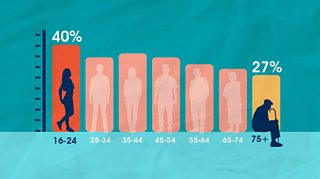Nine ways to feel less lonely
By Claudia Hammond, presenter of Radio 4’s All in the Mind
The world’s largest survey on loneliness – the – asked about ways of combatting loneliness which had worked for you or people you know. The same solutions won’t work for everyone but this is what you told us you found useful.

1. Find distracting activities or dedicate time to work, study or hobbies
Loneliness is often temporary, something we experience when we’re going through transitions in life such as starting college or moving to a new place.
So absorbing activities might help distract you from the painful feelings until time passes and you feel less lonely.
If you can find an activity that absorbs your attention so much that you don’t even notice the time passing, you can experience what’s known as a state of “flow” which can improve your well-being.
2. Join a social club or take up new social activities and pastimes
This one sounds like a bit of a cliché, but if the reason for your loneliness is that you don’t meet people in your community, then this might be the solution for you. But it’s not for everybody.

It’s not always easy to go and start talking to people in a room where you know no one, which might be why this also appeared in the survey’s top five least helpful suggestions for people who feel lonely!
If the idea of chatting to strangers makes you nervous, choose a club where you might be doing something side by side – craft classes or a choir perhaps. Then there’s less pressure to talk if you don’t want to. The key is to choose something you’re really interested in and then you might find you have lots in common with the other people there.
3. Change your thinking to make it more positive
In our survey we tested empathy levels and found that people who say they feel lonely showed higher levels of empathy for other people’s social pain. We also measured social skills and theirs were just as good as everyone else’s. So it’s not that people who feel lonely need to learn new social skills, but what might help are strategies to cope with the anxiety of situations.
It’s also worth remembering that loneliness is often temporary and that you won’t feel like this forever.
4. Start a conversation with anyone
It can take some nerve to start chatting to strangers, but you don’t have to say anything deep. There’s a reason talking about the weather is so popular in the UK – it’s changeable so you can say to someone in a shop or at the bus stop “hot/cold/wet/lovely isn’t it?”

The idea of this isn’t to build a deep friendship. It’s to feel more connected to other humans. Every time we have a conversation, even if it seems inconsequential, it reminds us that we all share the same world.
5. Talk to friends or family about your feelings
This solution was suggested more often by people who don’t feel lonely than people who do, which suggests that it might be easier said than done if you’re experiencing chronic loneliness.
We found that many people do still feel there’s a stigma surrounding loneliness, but the good news is that younger people said they would be less likely to conceal their loneliness than older people. So perhaps over time it’s getting slightly easier to talk about it.
You might worry about other people’s reactions, but in the survey we found that in general people don’t think badly of those who are lonely. And I see as a positive sign the fact that many thousands of people who don’t feel lonely were prepared to spend 40 minutes filling in a survey that’s trying to find solutions. So if you tell someone about it, you might be surprised at their reaction.
6. Look for the good in every person you meet
We found that people who feel lonely have on average lower levels of trust in others. So this solution is all about deliberately looking for the best in people in order to trust them a little bit more. If you think someone has snubbed you, ask yourself to look really hard at the evidence for whether this is true and then suggest alternative options. Maybe they were busy or tired or perhaps feeling sad or nervous themselves. It was probably nothing to do with you.
7. Take time to think why you feel lonely
The people I met for The Anatomy of Loneliness put their loneliness down to different causes. Some were physically isolated, others experienced discrimination, some found it hard to trust people, while others didn’t know where to find like-minded people.

Working out why you feel lonely is a first step to working out which solution might work for you. And if one solution doesn’t work, it’s worth trying another.
8. Carry on and wait for the feeling to pass
We know that loneliness is often temporary, so this will work for some people. For those where it’s become chronic, other solutions might be more effective.
But it’s encouraging that so many people who have felt lonely found that waiting for the feeling to pass did work, because it shows that many feelings of loneliness do disappear over time.
9. Invite people to do things without fearing rejection
It’s good to ask people to do things with you. Everyone wants to think that other people like them and most are pleased when they’re invited to something. But try not to feel afraid of them saying no. If they say they are busy that day, they probably are. Don’t assume that they’re just avoiding you.
Not every solution will work for everyone. The people I’ve met for the series The Anatomy of Loneliness have tried various solutions to their loneliness. And if one thing doesn’t work, try something different.
The 麻豆官网首页入口 Loneliness Experiment was conducted in collaboration with Wellcome Collection and devised by psychologists from the University of Manchester, the University of Exeter and Brunel University London.

Related Links
More from All in the Mind
-
![]()
A short animation on the results of the loneliness survey.
-
![]()
Claudia Hammond presents the findings of the world鈥檚 largest loneliness study.
-
![]()
How to manage your worries
A guide for how to cope with the things you worry about.
-
![]()
The Anatomy of Loneliness
Claudia Hammond and guests discuss the results of the 麻豆官网首页入口 Loneliness Experiment.




